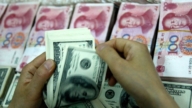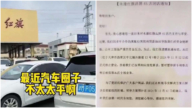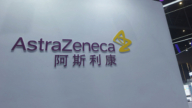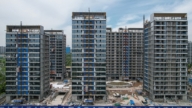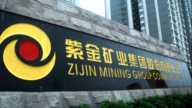【新唐人2012年10月2日讯】中共国家统计局“服务业调查中心”和“中国物流与采购联合会”发布,9月份中国制造业采购经理指数(PMI)为49.8%,这是自今年5月份以来,PMI首次比前一个月回升。虽然,PMI微升到荣枯分水岭的50附近,但有专家认为,中国经济下走的原因没有消除,看不出有回升的理由。
10月1号,中共喉舌《新华网》所发布的数据显示,9月份中国制造业采购经理指数PMI为49.8%,比上个月回升0.6%。
不过,“汇丰控股有限公司”上周六公布,9月份汇丰中国制造业PMI终值为47.9。一如既往,比中国官方交出的成绩低。
美国《华尔街日报》分析,中国官方PMI比汇丰PMI显得要积极的原因是,官方PMI更多的侧重大型国有企业,而这些企业比私营出口商,受到当前经济放缓的影响较少。“汇丰”PMI则更多的反映出私营出口商的情况。
经济专家,美国南卡罗莱纳大学艾肯商学院教授谢田指出,一些外资银行也在做中国制造业PMI调查,中共即使想造假,也不能太肆无忌惮。“汇丰”公布的数字比较客观、全面。
谢田:“这个PMI数字,跟中共公布的其他数字一样,都一定存在着各种程度上的造假问题。这个统计的误差,或者中共刻意营造繁荣或者经济恢复的假象,都可能造成这个数据的出现,这个基本来说不足为奇。所以,我们对中共数字基本上不能够持相信的态度。”
另外,“标准普尔”亚太主权评级主管陈锦荣向媒体表示,预计,今年第四季度中国经济将出现最为严重的放缓。他还预估,中国经济不会出现强劲反弹,但第四季度之后,国内需求将会改善,经济也将停止下滑。“汇丰”大中华区首席经济学家屈宏斌在声明中表示:“中国制造业增速可能正在触底”。同时,新出口订单加速下滑,就业市场仍然持续存在压力。
但中国著名经济学家茅于轼则不完全认同。他指出,目前中国制造业出现两个问题,一个是存货在增加,一是订单的减少。
中国著名经济学者茅于轼:“这两个消息都不是好消息。我认为收缩还没有到底,我的估计。”
实际上,中国经济去年下半年就开始往下走。茅于轼指出,中国经济下滑的根本原因目前还没有去掉。主要是2008年大量投资的项目,现在一个个都已建设完成,但建成后不能赚钱,很多项目还赔钱,造成了金融相对紧张。
茅于轼:“另外,欧盟的问题一直没有解决,我们的出口一直在下降﹔国内的金融业,说是要改善,没有重大变化﹔垄断行业利润还是很高,民营企业还是困难。这些情况没有改变,中国经济要见底、回升,不大可能﹔我看不出有见底、回升的理由。”
谢田也认为,中国经济低迷、衰退会继续持续一段时间。他说,中国制造业会不会有所改进,决定于中国经济结构、制度上的问题、弊端是否已得到解决。
谢田:“那我们知道,中共主要依赖的出口市场,欧洲也好,美国也好,经济上都没有很大的改善,而中国自己内需的问题也没有解决,现在通货膨胀问题依然严重,再加上中国社会、政治和体制上一些不安定的因素,现在看不出经济会很快复苏的可能。”
制造业采购经理指数高于荣枯分水岭的50,表示经济增长扩张﹔低于50则表示下滑萎缩。那么,从中共提出的数字来看,中国的经济仍然继续萎缩。
另一方面,由于中国的主要贸易伙伴需求仍较疲软,9月PMI新出口订单分项指数降到44.9,是42个月以来最低水准。
采访编辑/梁欣 后制/李月
Experts Doubt China’s Purchase Management Index (PMI) for September Slightly Rising.
The China National Bureau of Statistics’ Institute’s Services
Survey Center and Federation of Logistics & Purchasing (CFLP) made an announced recently.
In September 2012, China’s manufacturing sector
Purchasing Managers Index (PMI) was 49.8%.
This was the first rebound over
the previous month since May 2012.
Although the PMI is close to 50%, some experts
believe that an economic slow-down is still possible.
They cannot understand the reason for the rebound.
On October 1, Chinese Communist Party (CCP)
state media Xinhua Net reported that
China’s manufacturing sector PMI was 49.8%,
0.6% higher than the previous month.
However, HSBC Holdings PLC (HSBC) announced that
China’s manufacturing sector PMI was 47.9%, which was
the same as before, and lower than the official CCP number.
The Wall Street Journal analyzed the reason for the CCP
official number being higher than HSBC’s number.
The official number focuses more on
large-scale state-owned enterprises.
These are less affected by the current economic
slowdown. HSBC focuses more on private exporters.
Economic expert, Professor Xie Tian points out that some
foreign banks are doing a China Manufacturing PMI survey.
It is not easy for the CCP to fabricate numbers.
HSBC’s figures are more objective and comprehensive.
Xie Tian: “The CCP’s PMI number, like
its other numbers, are not true to a certain extent.
Error in the statistics and the intention to create an appearance
of economic recovery might have all led to this figure.
It is not surprising. We cannot trust the CCP’s number."
In addition, Standard & Poor’s APAC Sovereign
Ratings leader, Kimeng Tan commented to the media.
China’s economy will have the most serious slowdown in Q4.
He also predicts that China’s economy won’t have a strong
rebound, but it’s domestic demand will improve after the Q4.
Chief economist of HSBC China Qu Hongbin:
“China’s manufacturing growth may be bottoming out.”
Meanwhile, new export orders declined at a faster pace,
and there are still pressures in the job market.
Renowned Chinese economist Mao Yushi thinks differently.
He points out that there are two problems in China’s
manufacturing sector; inventories increase and order declines.
Mao Yushi: “None of these two are good news.
I do not think the slow-down has bottomed.”
In fact, China’s economy began to drop since Q2 in 2011.
Mao Yushi pointed out that the fundamental reason
for the decline in China’s economy is still not removed.
The main reason is that a large number of the 2008
investment projects are now completed.
However, they do not make money, thus
resulting in a relatively tight financial situation.
Mao Yushi: “In addition, the problems in the European Union
are not resolved yet, so our exports have been on the decline.
There is no significant change in the domestic financial sector.
Monopoly industries still have high profits,
and private enterprises operate with difficulties.
These circumstances have not improved.
It is not possible for the Chinese economy to rebound.
Personally, I do not see the reason to pick up”
Xie Tian also thinks China’s economic
recession will continue for some time.
He said that China’s manufacturing industry will not improve.
It depends on whether China’s economic structure
and institutional drawbacks will be resolved.
Xie Tian: “We know the CCP depends on export.
The economy in Europe or U.S. has not greatly improved.
China’s domestic demand has not been resolved,
and inflation remains a serious problem.
These, coupled with unstable social and political factors,
make it unlikely that the economy will recover soon in China.”
A manufacturing PMI higher than 50% indicates an
economic increase; lower than 50% means slow-down.
Even from the CCP’s figure,
China’s economy is still declining.
On the other hand, China’s major trading
partners still have a weak demand.
September’s new PMI export order index
dropped to 44.9%, the lowest in 42 months.



